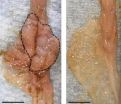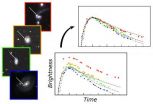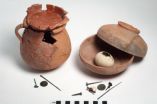(Press-News.org) Screening for breast cancer appeared to have a very limited effect on the occurrence of serious and aggressive cancer cases. On the other hand, it appeared to detect many more early cancer cases, cases which would otherwise never have developed - but which are treated due to screening.
This is the conclusion of a study from Aarhus University, Denmark, that has just been published in the European Journal of Public Health based on data from all women over the age of 20 in Norway (approx. 1.8 million in 2010).
Looks at the various stages of cancer
The new element is that the researchers look at the severity of the diagnosis, which is divided into four stages: From the very early stages of cancer which is completely local up to the very serious cases where the cancer has already spread.
The researchers examined the stage distribution of breast cancer diagnosed before the introduction of screening, during the introduction and after the scheme was fully implemented.
"The idea of screening is that the cancer should be detected as early as possible so that the woman can be treated and cured. So when you introduce screening women should be, as it were, transferred from having cancer in advanced stages to having cancer in an early stage. That is, if the screening works according to plan," says Associate Professor, PhD Henrik Støvring, Aarhus University, who is the key researcher behind the project together with BSc Mette Lise Lousdal.
rimarily discovers indolent cancer
The researchers examined how the distribution of the four stages of cancer developed from 1987 to 2010:
"We can see that since screening was introduced in Norway, the rate of discovery of breast cancer in the early stage among women aged 50-69 has almost doubled - while there has been virtually no change in the number of advanced stages. This suggests that screening primarily detects more cases of indolent cancer, which if there had been no screening, the woman would have died with - and not died of," says Henrik Støvring.
He adds that the screening may still have had a beneficial effect on mortality - this aspect was not examined by the study.
"But if that was the case then there should indeed be an increase of the early stages, but there ought to be an almost equally sized decline in the late stages as well. And this we did not find," he says.
The next step in the research project will be to analyse similar figures from Denmark.
INFORMATION: END
Screening does not shift breast cancer to earlier stages
New research from Aarhus University suggests that screening for breast cancer results in increased diagnoses of early stage cancer -- but without a similarly sized decrease in the more serious and aggressive cases
2014-03-04
ELSE PRESS RELEASES FROM THIS DATE:
Pulling polymers leads to new insights into their mechanical behavior
2014-03-04
In collaboration with colleagues from Berlin and Madrid, researchers at the Department of Physics at the University of Basel have pulled up isolated molecular chains from a gold surface, using the tip of an atomic force microscope (AFM). The observed signal provides insight into the detachment force and binding energy of molecules. The results have been published in the renowned scientific journal PNAS.
Atomic force microscopy is a method normally used for imaging matter with very high resolution. The sharp tip of the microscope is used to scan the surface line by line. ...
Yoga regulates stress hormones and improves quality of life for women with breast cancer undergoing radiation therapy
2014-03-04
HOUSTON — For women with breast cancer undergoing radiation therapy, yoga offers unique benefits beyond fighting fatigue, according to research from The University of Texas MD Anderson Cancer Center.
The preliminary findings were first reported in 2011 by Lorenzo Cohen, Ph.D., professor and director of the Integrative Medicine Program at MD Anderson, and are now published in the Journal of Clinical Oncology. This research is part of an ongoing effort to scientifically validate mind-body interventions in cancer patients and was conducted in collaboration with India's ...
Eliminating bacteria, changing lifestyle could lower risk in people genetically susceptible to colorectal cancer
2014-03-04
New York, NY— Bacteria in the gut are essential for the development of intestinal tumors in mice, according to research led by investigators from the Icahn School of Medicine at Mount Sinai. Removing the bacteria may play a critical role in reducing cancer risk, the researchers write, in the March issue of the Journal of Experimental Medicine.
Sergio A. Lira, MD, PhD, Director of the Immunology Institute, and Professor of Immunology and Medicine, and his laboratory at the Icahn School of Medicine at Mount Sinai, used a transgenic mouse model to test the hypothesis that ...
Standard-candle supernovae are still standard, but why?
2014-03-04
Sixteen years ago two teams of supernova hunters, one led by Saul Perlmutter of the U.S. Department of Energy's Lawrence Berkeley National Laboratory (Berkeley Lab), the other by Brian Schmidt of the Australian National University, declared that the expansion of the universe is accelerating – a Nobel Prize-winning discovery tantamount to the discovery of dark energy. Both teams measured how fast the universe was expanding at different times in its history by comparing the brightnesses and redshifts of Type Ia supernovae, the best cosmological "standard candles."
These ...
Virtual bees help to unravel complex causes of colony decline
2014-03-04
Scientists have created an ingenious computer model that simulates a honey bee colony over the course of several years. The BEEHAVE model, published today in the Journal of Applied Ecology, was created to investigate the losses of honeybee colonies that have been reported in recent years and to identify the best course of action for improving honeybee health.
A team of scientists, led by Professor Juliet Osborne from the Environment and Sustainability Institute, University of Exeter (and previously at Rothamsted Research), developed BEEHAVE, which simulates the life of ...
Sardis dig yields enigmatic trove: Ritual egg in a pot
2014-03-04
MADISON, Wis. — By any measure, the ancient city of Sardis — home of the fabled King Croesus, a name synonymous with gold and vast wealth, and the city where coinage was invented — is an archaeological wonder.
The ruins of Sardis, in what is now Turkey, have been a rich source of knowledge about classical antiquity from the 7th century B.C., when the city was the capital of Lydia, through later Greek and Roman occupations.
Now, however, Sardis has given up another treasure in the form of two enigmatic ritual deposits, which are proving more difficult to fathom than ...
World-class orchestras judged by sight not sound
2014-03-04
World-class orchestras can be accurately identified by silent video footage of performances, but not through sound recordings, a UCL study has found.
Both professional musicians and musical novices are better at identifying top-ranked orchestras from non-ranked orchestras when shown silent video footage, suggesting that such judgements are driven at least in part by visual cues about group dynamics and leadership.
When shown two 6-second clips, one from a world-class orchestra ranked among the top ten internationally - which included the London Symphony Orchestra, the ...
Plant extract offers hope for infant motor neurone therapy
2014-03-04
A chemical found in plants could reduce the symptoms of a rare muscle disease that leaves children with little or no control of their movements.
Scientists have found that a plant pigment called quercetin – found in some fruits, vegetables, herbs and grains – could help to prevent the damage to nerves associated with the childhood form of motor neuron disease.
Their findings could pave the way for new treatments for spinal muscular atrophy (SMA) – also known as floppy baby syndrome – which is a leading genetic cause of death in children.
The team has found that the ...
Yeast model reveals Alzheimer's drug candidate and its mechanism of action
2014-03-04
CAMBRIDGE, Mass. (March 3, 2014) – Using a yeast model of Alzheimer's disease (AD), Whitehead Institute researchers have identified a drug that reduces levels of the toxic protein fragment amyloid-β (Aβ) and prevents at least some of the cellular damage caused when Aβ accumulates in the brains of AD patients.
"We can use this yeast model to find small molecules that will address the underlying cellular pathologies of Alzheimer's, an age-related disease whose burden will become even more significant as our population grows older," says Kent Matlack, a former ...
Childhood adversity launches lifelong relationship and health disadvantages for black men
2014-03-04
AUSTIN, Texas — African American men who endured greater childhood adversity are likely to experience disadvantages in health and relationships over time, according to new sociology research from The University of Texas at Austin.
The study, published in the March issue of the Journal of Health and Social Behavior, helps to explain why African American men are less healthy than white men.
"Exposure to childhood adversity may cause stress and lead to a sequence of stressors over time that take a cumulative toll on relationships," says Debra Umberson, professor of sociology ...
LAST 30 PRESS RELEASES:
CU Anschutz School of Medicine receives best ranking in NIH funding in 20 years
Mayo Clinic opens patient information office in Cayman Islands
Phonon lasers unlock ultrabroadband acoustic frequency combs
Babies with an increased likelihood of autism may struggle to settle into deep, restorative sleep, according to a new study from the University of East Anglia.
National Reactor Innovation Center opens Molten Salt Thermophysical Examination Capability at INL
International Progressive MS Alliance awards €6.9 million to three studies researching therapies to address common symptoms of progressive MS
Can your soil’s color predict its health?
Biochar nanomaterials could transform medicine, energy, and climate solutions
Turning waste into power: scientists convert discarded phone batteries and industrial lignin into high-performance sodium battery materials
PhD student maps mysterious upper atmosphere of Uranus for the first time
Idaho National Laboratory to accelerate nuclear energy deployment with NVIDIA AI through the Genesis Mission
Blood test could help guide treatment decisions in germ cell tumors
New ‘scimitar-crested’ Spinosaurus species discovered in the central Sahara
“Cyborg” pancreatic organoids can monitor the maturation of islet cells
Technique to extract concepts from AI models can help steer and monitor model outputs
Study clarifies the cancer genome in domestic cats
Crested Spinosaurus fossil was aquatic, but lived 1,000 kilometers from the Tethys Sea
MULTI-evolve: Rapid evolution of complex multi-mutant proteins
A new method to steer AI output uncovers vulnerabilities and potential improvements
Why some objects in space look like snowmen
Flickering glacial climate may have shaped early human evolution
First AHA/ACC acute pulmonary embolism guideline: prompt diagnosis and treatment are key
Could “cyborg” transplants replace pancreatic tissue damaged by diabetes?
Hearing a molecule’s solo performance
Justice after trauma? Race, red tape keep sexual assault victims from compensation
Columbia researchers awarded ARPA-H funding to speed diagnosis of lymphatic disorders
James R. Downing, MD, to step down as president and CEO of St. Jude Children’s Research Hospital in late 2026
A remote-controlled CAR-T for safer immunotherapy
UT College of Veterinary Medicine dean elected Fellow of the American Academy of Microbiology
AERA selects 34 exemplary scholars as 2026 Fellows
[Press-News.org] Screening does not shift breast cancer to earlier stagesNew research from Aarhus University suggests that screening for breast cancer results in increased diagnoses of early stage cancer -- but without a similarly sized decrease in the more serious and aggressive cases




